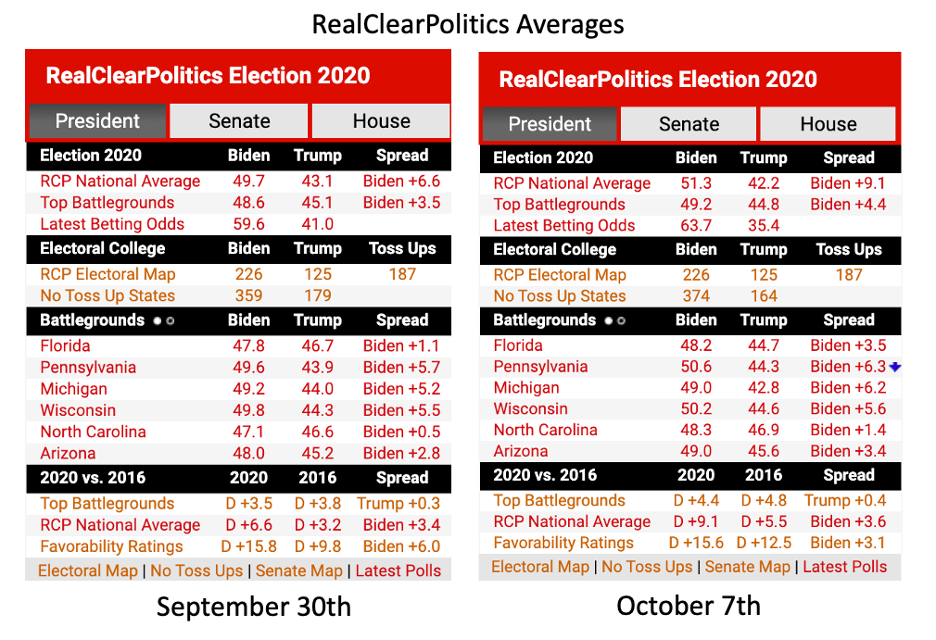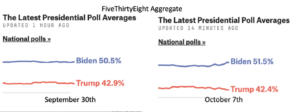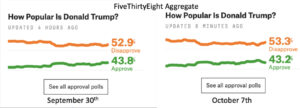Last week, in what feels like a long time ago, there was a debate between the two major-party candidates for President of the United States. The COVID-19 diagnosis of the President has dominated the news the past few days – affecting the state of the race – but using survey data, we can see a clear winner from the first debate.
Instead of entertaining how polling affected the 2016 race or “Dewey Defeats Truman,” let’s get some facts clear. Each polling service has established its own polling model measuring how they think turnout will be for this election. They each weigh demographics and methodology to their polling results. These methods have not changed throughout the election cycle, giving a consistent way to measure response.

Two places offer outstanding election data – FiveThirtyEight and RealClear Politics – which both update every Wednesday. One determination I am using in deciding who won the debate was marking where the race was the Wednesday after the debate, and then looking at where the race was on those sites one week later. This past Wednesday, both pollsters have said that the race moved toward Biden. In FiveThirtyEight, he went from an aggregate 7.6% lead to a 9.1% lead. In the RealClearPolitics’ average of polls: Biden’s lead grew from a 6.6 to a 9.1 margin. Across the RealClear Battleground State Averages, Biden gained; in the No Toss Up Electoral number, Biden gained 14 electoral votes.
You can also look at the various other polls taken after the debate. CNN had one measure that showed voters preferred Biden’s performance over Trump by a wide margin. The CBS ‘flash poll’ right after the debate showed a 48% to 41% margin. Perhaps the most interesting post-debate poll was from NBC. Taken days after the debate – giving the public time to digest all forms of analysis – the poll showed that voters preferred Biden’s performance over Trump’s. In the battle of the who won the polls, the public picked Biden.


One other data-driven metric is what I call the “close the deal” number. For Trump, you will see an equal percentage of people who approve of him and say they will vote for him against those who won’t. There is a big difference for Biden. There is a four-point difference between those who disapprove of Trump and will vote for Biden. That narrowed from 2.4 to 1.8 points. It is another victory for Biden.
Then there is the post-debate coverage from a qualitative standpoint. What was the most memorable moment? What stuck out? Was there a ‘gotcha moment’ like President Ronald Reagan’s “Are you better off now…” zinger? For Biden, the answer is no. Sure, some highlighted his “Would you shut up, man!” comment, but Donald Trump drew the most fire from media for both his constant interruptions and an apparent nod to white supremacists.
From CNN’s Dana Bash referring to the debate as a “shitshow” to other networks’ negative reviews, there could have been an opposite reaction to mainstream media that could have swung the pendulum towards Trump. If this force of ‘anti-media’ sentiment existed, it would have moved polls. It didn’t. In fact, the national polls show Biden out front.
Both sides have a vested interest in debating. Trump needs to speak to 80 million Americans and try to get the race trajectory in his direction. Biden, seeing the net benefit of the last debate, would like to seal the race away. However, it is unclear if a second debate will happen. After the Commission announced it would make the second debate virtual, Trump said he wouldn’t participate, calling it “a waste of time.” In quick succession, Biden said he will take part in a town hall in Philadelphia hosted by ABC News on the 15th.
In the end, by any clear and objective measure, Joe Biden won the first debate. These two candidates are offering two strongly contrasting visions of the state of the nation and the world. They have very different solutions. For the GOP, the data coming out of the first debate has to be frightening. While the numbers look good for the Democrats, they should not rest on their laurels. If 2016 proved anything, they are still far away from closing the deal.
______________________________________________________________________________________________________________________

Jim Bloom
Jim Bloom is a marketing executive currently located in Dallas, TX. He has been involved with several digital, mobile, and social startups. Bloom also directed the marketing of the Moneyball era Oakland A’s and Toronto Blue Jays.
______________________________________________________________________________________________________________________






